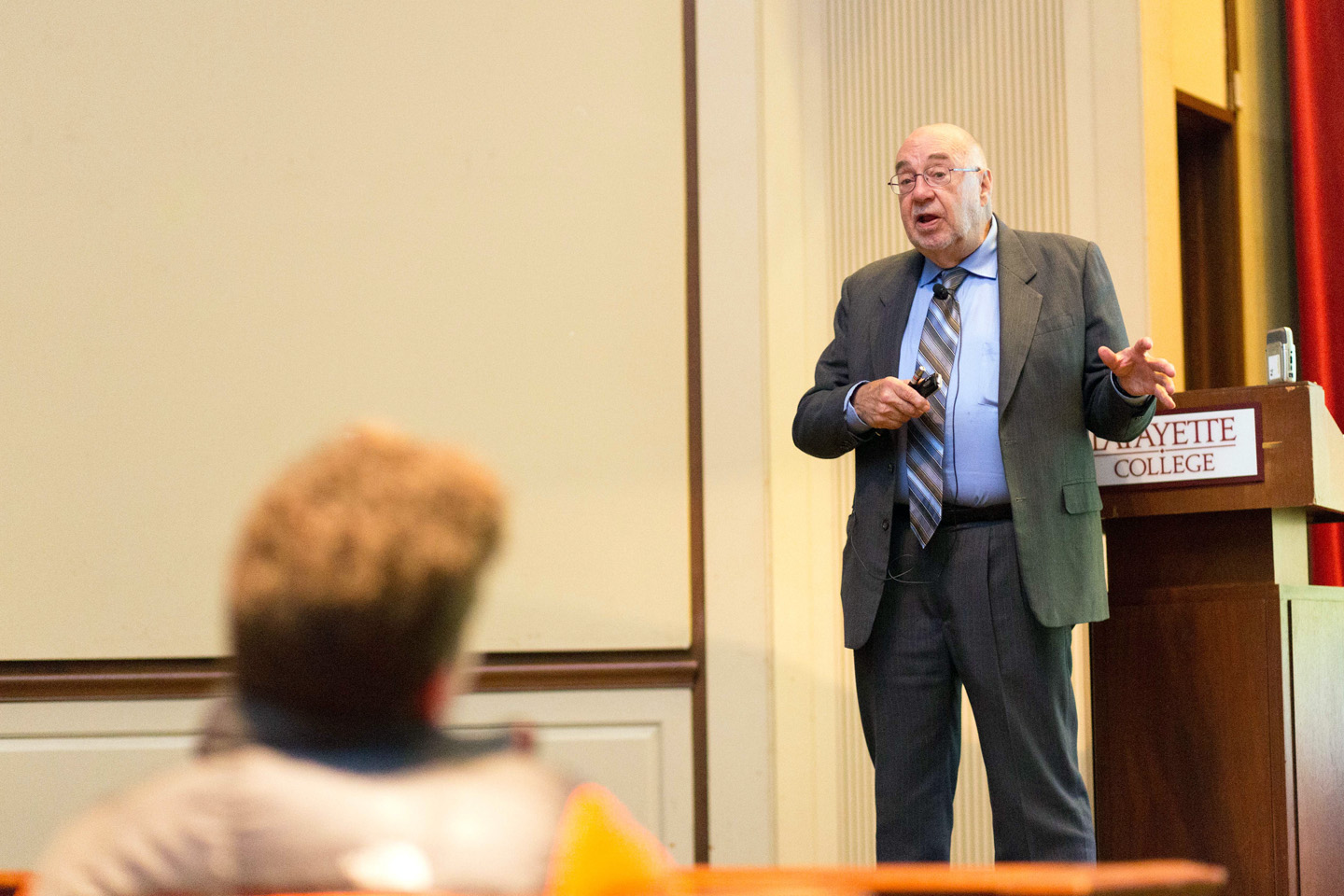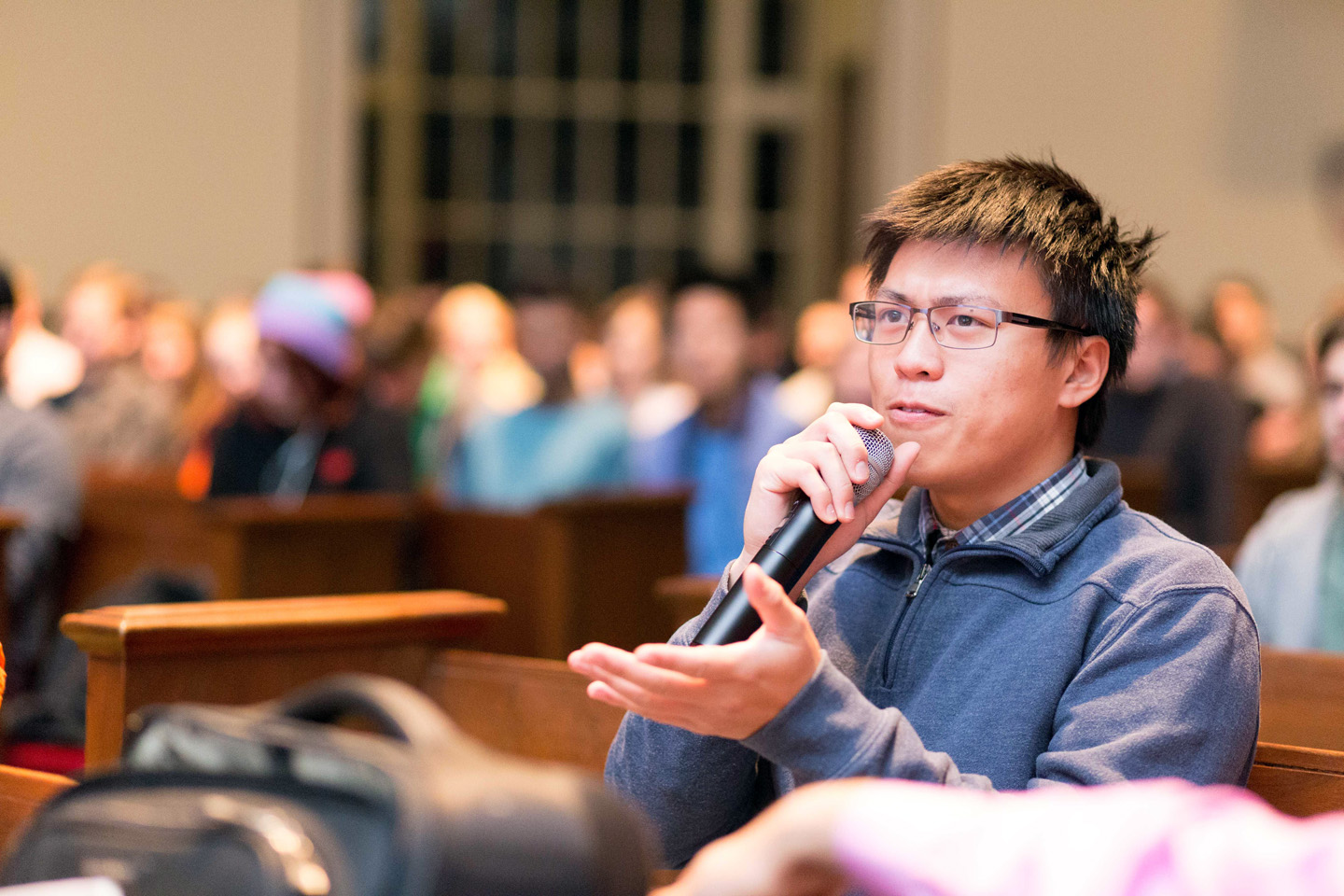Guest lecturer H. Scott Fogler praises Edward Hart’s chemical engineering contributions to Lafayette's legacy.

H. Scott Fogler speaks in Colton Chapel.
If George Bailey, the kind-hearted but frustrated savings-and-loan manager, had never been born, his hometown of Bedford Falls would have fallen into the hands of a greedy banker.
But thanks to Clarence, his guardian angel, Bailey — despondent over a missing bank deposit — was shown a not-so-pleasant view of what his small town would have looked like had he acted on his “I’m worth more dead than alive” impulse and given up.
Speaking to students and faculty Monday night at Colton Chapel, guest lecturer H. Scott Fogler drew comparisons from Bailey’s memorable character in the classic film It’s a Wonderful Life and Edward Hart of Easton, the first chair of chemical engineering at Lafayette College, industry leader, and a major force in the creation of the American Institute of Chemical Engineers.
“What if Hart had never been born?” Fogler asked as he opened the lecture honoring the centennial of Lafayette’s chemical engineering program. “For one thing, this 100th anniversary celebration most certainly would have been delayed.”
Fogler, a distinguished author, researcher, and the Ame and Catherine Vennema Professor of Chemical Engineering and the Arthur F. Thurnau Professor at the University of Michigan in Ann Arbor, listed pioneering and prestigious chemical engineering companies, institutions, and inventions that would not have existed without Hart’s vision, passion, and entrepreneurship.

A student asks Fogler a question.
Among them are: J.T. Baker, Allied Chemical, the Journal of Analytical Chemistry, the Journal of the American Chemical Society, the American Institute of Chemical Engineers and the first chemical engineering textbook in the United States.
He also invented a wax-lined bottle for storing hydrofluoric acid and the Hart condenser, used during World War I for condensing the large amounts of nitric acid needed to make nitroglycerin.
“Hart, who had his own printing press, steered the Journal of the American Chemical Society through hard times and served as its second editor,” Fogler said. “It’s the most prestigious journal in chemical engineering.”
Fogler, who served as president of the American Institute of Chemical Engineers in 2009 — a post made possible by Hart — also discussed how the patriarch of Lafayette’s chemical engineering program would have embodied Steven Covey’s “7 Habits of Highly Effective People” and the “7 Actions for a Successful Career.”
“Hart convinced his colleagues at Lafayette to develop a curriculum in chemistry. He saw a need for a chemical engineering curriculum and moved forward, proactively, to put it in place here on this campus,” Fogler said. “You have to be proud of all that started here because of Edward Hart.”
Fogler urged students to follow Hart’s example and never give up on pursuing dreams and ideas and to look for solutions to perceived problems. Hart, largely self-taught, successfully completed any goal or challenge with limitless energy, enthusiasm, and a love for chemistry.
Like Hart, who reveled in the social aspects of his field, Fogler said he’s also found satisfaction in being surrounded by like-minded people who can provide valuable feedback.
“Find a job that doesn’t feel like a job; feel good about what you do,” he said. “Surround yourself with peers for advice and guidance.
“You have a great history, a great school,” Fogler said. “There’s strength of tradition here at Lafayette, one of the earliest schools in the nation to have a chemical engineering program. You were at the forefront.”

